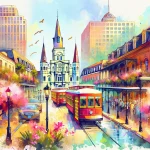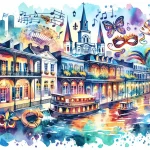Situated in the heart of New Orleans, a city deeply steeped in history and mystery, voodoo spiritual temples stand as a testament to the enduring legacy of African diaspora traditions. These sacred spaces offer a glimpse into the rich heritage of beliefs and practices that have shaped the cultural identity of the Crescent City for centuries. With an estimated 15% of New Orleanians actively practicing voodoo or hoodoo, the city remains a hub for this ancient spiritual tradition.
In This Article
TL;DR
- Voodoo temples in New Orleans provide spiritual guidance, healing rituals, and a profound connection to African diaspora heritage.
- Many temples welcome respectful visitors who wish to learn about or participate in authentic voodoo ceremonies.
- Voodoo continues to be an integral part of New Orleans’ cultural landscape, influencing its music, art, and festivals.
History of Voodoo in New Orleans
The roots of voodoo in New Orleans can be traced back to the Vodun spiritual practices brought by enslaved Africans from West Africa in the 18th century. As these beliefs merged with Native American and Catholic traditions, a unique form of voodoo emerged, characterized by the veneration of spirits known as loa, the use of charms and amulets, and the incorporation of Catholic saints.
One of the most influential figures in New Orleans voodoo history was Marie Laveau, a powerful priestess who gained prominence in the 1800s. Laveau’s legacy, though often sensationalized in media and tourism, remains a testament to the strength and resilience of the city’s African American community.
Voodoo Spiritual Beliefs and Practices
At the core of voodoo lies the belief in a supreme creator and a pantheon of spirits or loa that govern various aspects of life and nature. Practitioners seek guidance from their ancestors and use charms, amulets, voodoo dolls, and symbolic objects in their rituals.
During ceremonies, participants may experience spiritual possession by loa, accompanied by drumming, dancing, and singing. Voodoo also encompasses healing practices that utilize herbs, oils, and faith healing techniques. Importantly, voodoo ethics prohibit using the practice to harm others.
Notable Voodoo Temples in New Orleans
Voodoo Spiritual Temple
Founded in 1990 by Priestess Miriam Chamani, this temple is the only formally established voodoo temple in New Orleans. Located at 828 N. Rampart St., it offers spiritual readings, classes, and ceremonies. Open daily from 10am-6pm.
New Orleans Historic Voodoo Museum
Housed in a small, unassuming building at 724 Dumaine St., this museum showcases altars, artifacts, and exhibits that explore the history and practices of voodoo. Admission is $10 for adults. Open daily from 10am-6pm.
Voodoo Authentica Cultural Center and Collection
Situated at 612 Dumaine St., this center features an extensive collection of authentic voodoo artifacts, as well as offerings, readings, and workshops. Open daily from 11am-7pm.
Island of Salvation Botanica
Run by renowned priestess Sallie Ann Glassman, this botanica at 2372 St. Claude Ave. offers spiritual supplies, readings, and classes rooted in the New Orleans voodoo tradition. Open Tue-Sat from 11am-6pm.
Attending Ceremonies at Voodoo Temples
Visitors attending a voodoo ceremony can expect an immersive experience filled with drumming, dancing, singing, and spirit possession. Participants are encouraged to approach the rituals with respect and an open mind.
Common ceremonial elements may include the creation of altars, offerings to the loa, and the use of sacred objects like candles and veves (religious symbols). Visitors should dress modestly and avoid taking photos or videos without permission. Offerings or donations to the temple are appreciated.
Throughout the year, voodoo temples host festivals and events that celebrate the tradition’s rich heritage. The annual Voodoo Fest, held in October, features live music, art, and cultural performances that honor the city’s voodoo roots.
Finding Legitimate Voodoo Temples
When seeking out voodoo temples in New Orleans, it’s crucial to find reputable establishments and practitioners. Be wary of tourist traps that focus more on spectacle than spirituality, and avoid temples that pressure visitors into purchasing services or goods.
Well-established temples like the Voodoo Spiritual Temple, Voodoo Authentica, and Island of Salvation Botanica are known for their commitment to educating visitors about authentic voodoo practices and preserving the tradition’s heritage.
Respecting Voodoo Culture
As you explore the world of New Orleans voodoo, remember to approach the tradition with respect and an open mind. Voodoo is a legitimate spiritual practice, not a tourist attraction or a source of entertainment.
Be mindful of cultural appropriation and avoid perpetuating stereotypes or misconceptions about voodoo. Support temples that actively work to educate the public about the tradition’s true nature and preserve its legacy for future generations.
When purchasing voodoo-related items, seek out authentic goods crafted by knowledgeable practitioners rather than mass-produced souvenirs. By doing so, you help sustain the livelihoods of those who dedicate their lives to this ancient spiritual practice.
Voodoo’s Influence on New Orleans Culture
The impact of voodoo on New Orleans culture extends far beyond the walls of its spiritual temples. The tradition has left an indelible mark on the city’s music, cuisine, art, and festivals, serving as a symbol of its African diaspora heritage and resilience.
From the rhythms of jazz and blues to the flavors of Creole cuisine, voodoo’s influence can be felt in every aspect of New Orleans life. The city’s vibrant Mardi Gras celebrations, with their elaborate costumes and parades, also bear the imprint of voodoo’s visual and spiritual symbolism.
Today, efforts to protect and promote authentic voodoo culture continue, with practitioners and community leaders working to foster greater understanding and appreciation for this vital part of New Orleans’ identity. By engaging with the tradition respectfully and supporting its preservation, visitors can play a role in ensuring that voodoo remains a living, thriving presence in the city for generations to come.






